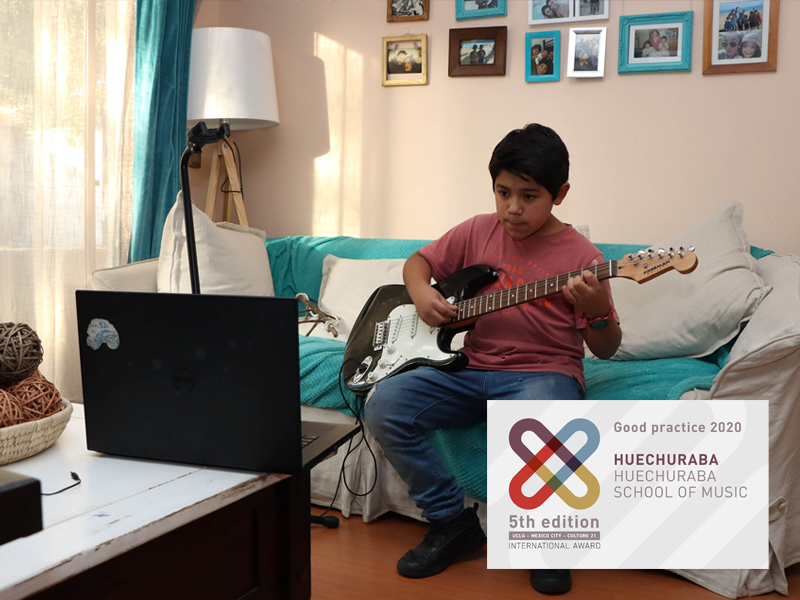Huechuraba School of Music
1. Huechuraba and culture
Huechuraba is a commune in the Metropolitan Region of Chile, located in the northern part of Santiago. The name Huechuraba in Mapudungun, the native language of the Mapuche people, means “place where the clay is born”. It was founded in 1991 and has a population of over 98,000, geographically divided into two sectors: the old town where 60% of the population lives and the western sector where 40% reside.
The local government has established itself as an institution that promotes the talent of its community, reviving cultural traditions and identity, and carrying out high-level artistic activities at no cost to the inhabitants. This has made the government an influential hub for culture throughout the region. Huechuraba is a fertile space for artistic creation, practice, and expression. For years this has been expressed in the field of music in various ways and styles, from parades, batucada, and folk groups to countless rock bands, pop, fusion, reggae, hip-hop, and many other different styles.
The Covid-19 pandemic transformed everything the city of Huechuraba knew about practicing culture.
2. Project goals and implementation
2.1. Main goal and specific objectives
The Huechuraba Music School is an initiative that was created during the first months of the COVID-19 pandemic in Chile. In order to adhere to public health and social distancing guidelines the Department of Culture of the Municipality of Huechuraba had to adapt its programs to online formats to offer cultural content.
The School aims to promote the creation and artistic expression of the inhabitants of the community of Huechuraba who practice or wish to practice musical activities. The purpose is to develop a fun and safe space where residents can enjoy, discover, learn, and improve upon their musical knowledge
2.2. Project development
The COVID-19 pandemic transformed everything the city of Huechuraba knew about practicing culture. It had significant impacts on culture since most of the area’s workshops and activities were carried out in-person.
As a result, teachers and artists working in the city’s cultural sector began to record videos of their sessions and workshops. These were then broadcast at different times through municipal social networks and were widely viewed by the community. As a result of the success of some of the virtual music education workshops, the decision was made to regularly continue some of them. This made it possible to create a high-level music school that was free and open to the community, which was initially developed online. It should be noted that private music lessons can be expensive in Chile and often cannot be financed by families in low-income or other vulnerable situations, which is primarily the case for those in this community.
The Music School teaches 11 different musical disciplines: piano, acoustic and electric guitar, violin, cello, bass, singing, trumpet, saxophone, drums, Afro-Latin percussion, and Andean instruments, as well as a compulsory course in music theory.
The school offers a three-year academic program divided into 6 semesters, with a schedule of 2 hours of study per
week. There are 185 vacancies available for students 7 to 65 years of age. Applicants must go through an audition
and interview process to be admitted.
The pandemic made it possible to create a high-level music school that was free and open to the community, which was initially developed online.
3. Impacts
3.1. Direct impacts
The Huechuraba Municipal Music School celebrated its first year anniversary in 2021 with a level of acceptance that surpassed all expectations. Initially it had 350 students, who participated in the online format. This created a very high demand for classes, proving that there was a need within the community to develop in the field of music.
In 2022, the classes returned to in-person with capacity for 186 people, while adhering to public health measures.
In the first year , the Huechuraba Municipal Music School demonstrated the true importance and necessity of musical activity in spaces, particularly in crucial moments such as the pandemic. Ultimately, this showed a great and continued demand for cultural learning spaces.
3.2. Assessment
The current indicators for achievement include the regular attendance numbers quotas, and the academic evaluation focused on the particular processes of each student.
3.3. Key factors
The key factors of the project were the management of human and economic resources and logistics that would allow for high-level teaching and maintain the local government’s commitment to the program.
3.4. Continuity
The pandemic offered an opportunity to take advantage of an online virtual format to reach a wider audience in the community, especially the vulnerable areas of the territory. Although the program has returned to in-person learning, online classes are offered as a supporting method, and many cultural classes of the different workshops are carried out in this way, with others done in a hybrid format.
The in-person approach saw a significant drop in the number of applicants, since many users expressed a preference for the virtual format over face-to-face interaction. The reasons for this varied, and included issues related to distance, travel, work, academic reasons, etc. However, the cultural centre did not have the adequate space to set up a Music School entirely for in-person learning. Therefore, agreements were made with 3 municipal education institutions that provided their facilities for classes in 2022.
The pandemic offered an opportunity to take advantage of an online virtual format to reach a wider audience in the community, especially the vulnerable areas of the territory.
4. Further information
Huechuraba was a candidate for the fifth UCLG Mexico City – Culture 21 International Award (February - June 2022). The jury for the award drew up its final report in September of 2022, and requested that the UCLG Committee on Culture promote this project as one of the good practices implemented under Agenda 21 for culture.
This report was written by Bárbara Urquieta Valencia, Communications and Public Relations Manager, Santiago, Chile.
Contact: Barbara.urquieta (at) huechuraba.cl
Website: www.huechuraba.cl
